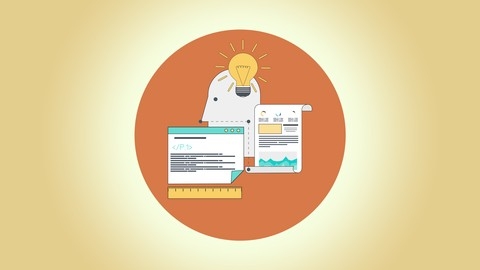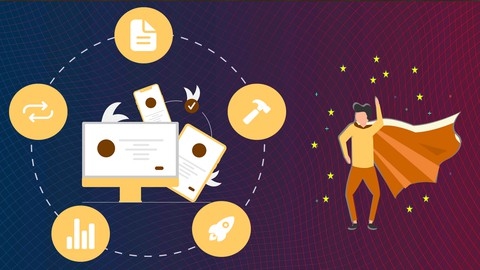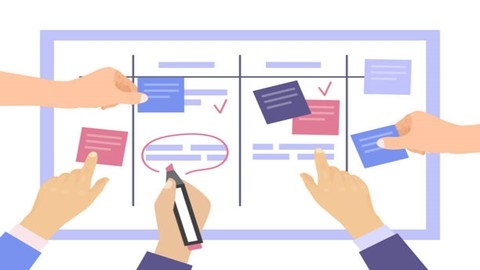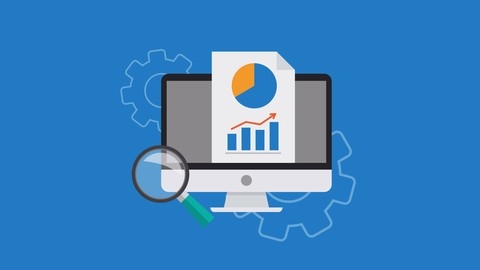Software development is a dynamic and rewarding field that empowers you to create innovative solutions and bring your ideas to life.
From building mobile apps and websites to developing complex software systems, the possibilities are endless.
Learning software development not only equips you with valuable technical skills but also fosters creativity, problem-solving abilities, and a deep understanding of how technology shapes our world.
Whether you aspire to become a professional software engineer or simply want to explore the fascinating world of coding, mastering the fundamentals of software development can open doors to a wide range of opportunities.
However, with the abundance of online learning platforms and courses available, finding the right software development course on Udemy can feel like navigating a maze.
You want a course that not only covers the essential concepts but also provides practical exercises, real-world projects, and guidance from experienced instructors.
You’re looking for a comprehensive learning experience that will equip you with the skills and confidence to succeed in this exciting field.
Based on our thorough analysis of numerous courses, we’ve identified SDLC Overview (1 Hour) - Software Development Life Cycle as the best overall software development course on Udemy.
This course provides a concise yet comprehensive introduction to the Software Development Life Cycle (SDLC), a crucial framework for building successful software projects.
It covers all the key phases of the SDLC, from requirements gathering and design to testing, deployment, and maintenance, providing you with a solid foundation for understanding the entire software development process.
While this is our top recommendation, we understand that your learning needs and preferences may be unique.
That’s why we’ve curated a list of other exceptional software development courses on Udemy, each catering to different skill levels, interests, and career goals.
So, continue reading to explore our comprehensive list of recommendations and find the perfect course to embark on your software development journey!
SDLC Overview (1 Hour) - Software Development Life Cycle
This one-hour SDLC Overview course is a great way to start if you want to learn about software development.
You will learn the basics of the Software Development Life Cycle (SDLC), a step-by-step guide for building software.
The course breaks down the SDLC into its key phases: requirements, design, development, testing, deployment, and maintenance.
You will discover how to gather requirements from users and define what the software needs to do in the Requirement Phase.
You will then explore the Design Phase, where you will plan the software’s structure, creating diagrams and flowcharts to visualize how the software works.
Next, you will learn about the Development/Coding Phase, where programmers write the code that brings the design to life.
Before the software is released, the Testing Phase ensures it works properly.
You will learn about different testing methods, like functional and performance testing.
Once the software is ready, you will explore the Deployment Phase, learning how to release and manage updates for users.
After deployment, the Maintenance Phase ensures the software continues running smoothly.
You will also compare two popular SDLC approaches–Agile and Waterfall–and see how they differ in organizing software development.
The course even explores different IT career options.
You’ll learn about roles like Software Engineer and QA and understand the typical organization of an IT department.
Each phase includes a quiz to test your understanding, ensuring you solidify your knowledge.
Software Development: Better Requirements Gathering Skills
This software development course teaches you how to gather better requirements, a crucial skill for building successful software.
You will begin by exploring the definition of software requirements and examining various types, including functional, non-functional, and user requirements.
The course then guides you through building a robust skillset by conducting feasibility studies, which help determine the practicality of a project.
You will discover effective techniques for gathering requirements, such as utilizing standard operating documents and asking the right questions to gather valuable information from stakeholders.
The course emphasizes understanding the interactions between different system components, a crucial aspect of software development.
You will also master managing requirements, learning tools and techniques for organizing, prioritizing, and tracking them throughout the development process.
Finally, you will dive into requirements specification and validation, learning to create clear documentation outlining the system’s functionality.
This documentation ensures the software meets the intended needs.
Interactive quizzes throughout the course reinforce learning and test comprehension, solidifying your understanding of requirements gathering and equipping you to build robust software solutions.
SDLC - Software Development Life Cycle SDLC
This Software Development Life Cycle (SDLC) course teaches you how software is built from beginning to end.
You discover how the SDLC helps developers create a smooth process from gathering requirements to launching the final product.
Think of it as a roadmap guiding you through the entire software creation journey.
You learn the seven phases of the SDLC: analysis and planning, requirements gathering, design and prototyping, development, testing, deployment, and maintenance.
Imagine building a house—each phase represents a stage, from designing the blueprint to adding the finishing touches.
The course uses the real-world example of building a website for DailyNeeds.com, showing how these phases work in a practical setting.
You delve into various SDLC models like Waterfall, Incremental, Iterative, V-Model, Spiral, and Agile.
You discover when each model is most effective based on the project’s complexity, timeline, and resources.
The course emphasizes Agile methodologies, known for their flexibility and responsiveness to change.
You learn about Agile principles and essential concepts like Minimum Viable Product (MVP), User Stories, and Burndown Charts.
You explore popular Agile frameworks like SCRUM, KANBAN, and Extreme Programming (XP).
You develop the skills to analyze software projects, identify the best approaches, and contribute effectively to a development team.
Software Development From A to Z - Beginner’s Complete Guide
This course demystifies software development, providing a clear path from beginner to proficient programmer.
You’ll explore various roles, like junior developers, UI/UX designers, and DevOps engineers, understanding the skills required for each.
You’ll delve into methodologies like Waterfall and Agile, gaining practical experience using tools like Asana for Kanban boards.
You’ll master Python programming, starting with variables, data types, and control flow, progressing to functions, loops, and containers.
You’ll build real-world projects, like cost calculators and travel time apps, solidifying your understanding.
Object-oriented programming is also covered, teaching you to implement classes and methods.
The course goes beyond coding, exploring algorithms for efficient problem-solving.
You’ll also learn HTML, CSS, and JavaScript, building a functional color theme picker for a website.
UML diagrams, used for modeling software systems, are also explained.
The course provides a strong foundation for a future in software development.
Agile Kanban: Kanban for Software Development Teams
This course teaches you everything about Kanban, a method used by software teams to manage projects and get work done.
You’ll learn how to set up a Kanban board, a visual tool that helps you track your project’s progress.
You’ll also discover how to find and fix problems in your workflow, like tasks that are too big or resources that aren’t being used well.
This course teaches you important Kanban practices used by real development teams every day.
You’ll learn how to define when a task is truly “done” and how to run daily standup meetings to keep your team on track.
Plus, you’ll even learn how to create your own Kanban board templates!
The course also dives into “Agile” which is a set of principles for building software.
You’ll explore key Agile concepts, such as how to organize your work into a Product Backlog, break down big tasks (Epics) into smaller ones (Stories), and estimate how long tasks will take using techniques like T-Shirt sizing, Fibonacci sequences, and Planning Poker.
You’ll discover how to use Kanban Flow Metrics like Cycle Time and Throughput to see how well your team is doing.
You’ll also explore the Cumulative Flow Diagram (CFD), a powerful tool that shows you how work is flowing through your team.
The course even introduces you to Little’s Law, a mathematical formula that helps you optimize your workflow.
By understanding these concepts, you can help your team work faster and more efficiently.
Business analysis & Scrum with JIRA for Software development
This course equips you with the skills needed to excel in software development, covering business analysis, Agile methodologies, and essential tools like JIRA.
You will start by mastering the fundamentals of business analysis, learning how to identify business needs and translate them into actionable software requirements.
This includes understanding the role of a Business Analyst and using key concepts like the Business Analysis Core Concept Model (BACCM).
You will then dive deep into requirement elicitation techniques, learning how to gather information from stakeholders and transform it into SMART requirements.
The course guides you through crafting a comprehensive Business Requirements Document (BRD), a crucial deliverable for any software project.
From there, you will discover Agile principles and the Scrum framework, gaining a thorough understanding of Scrum roles (Product Owner, Scrum Master, Development Team), events (like Sprint Planning), and artifacts (like the Product Backlog).
The course doesn’t just stop at theory; it provides practical experience using JIRA and Confluence, two industry-standard tools.
You will learn how to manage sprints, track progress, and collaborate effectively within these platforms.
You will also explore the world of Product Management, learning how to define a product vision, conduct market research, and utilize frameworks like SWOT analysis to achieve product-market fit.
Software Development and IT - Complete Guide To Key Concepts
This course takes you on a journey into the world of software development, beginning with the fundamentals of programming.
You will learn about different programming languages like Python and JavaScript, discovering their strengths and ideal use cases.
You will also explore popular frameworks like Django and Flask, gaining the skills to build everything from simple scripts to complex web applications.
The journey continues with a deep dive into the world of APIs.
You will learn how REST APIs work, how to interact with them using Python, and how data is exchanged using JSON.
This knowledge is crucial for building applications that connect with other services and exchange data seamlessly.
You will also discover the power of databases and learn how to store and manage data effectively using SQL.
As you progress, you will explore the cloud, understanding the benefits of cloud platforms like AWS and Google Cloud Platform.
You will learn about services like AWS S3 for storage and AWS Lambda for serverless computing, gaining the skills to build scalable and cost-effective applications.
The course also covers crucial aspects of application development, including testing, deployment, and the importance of maintaining different environments for your application.
You will learn about different testing methodologies, including unit testing with Python, ensuring the quality and reliability of your code.
Finally, you will delve into advanced concepts like containerization with Docker and container orchestration with Kubernetes, gaining the ability to package and deploy applications efficiently.
You will also explore different architectural patterns, including monolithic, microservices, and serverless, understanding when and why to choose each approach.
Along the way, you will learn about Agile methodologies like Scrum, version control with Git, and the roles of different engineers in a software development team.
Agile Scrum Advanced Software Development+Program Management
This course takes you beyond basic Agile and Scrum knowledge, pushing you to become a true expert.
You start by exploring the path to becoming a certified Scrum Master, a journey that equips you with the skills and credibility to lead Agile teams.
You learn how to effectively communicate the value of Scrum, mastering the art of explaining its benefits and principles.
Imagine having 72 compelling reasons at your fingertips, ready to persuade even the toughest skeptics.
The course dives deep into the practical application of Scrum.
You learn how to manage Sprints effectively, utilizing tools like Daily Scrums, Burn-down Charts, and Sprint Retrospectives to keep your projects on track and constantly improving.
You become well-versed in the roles within Scrum, understanding the dynamics between the Product Owner, Scrum Master, and Development Team.
You discover how these roles interact with essential elements like the Product Backlog, Definition of Done, and Sprint Planning to create a seamless development process.
Finally, you explore the world of scaling Scrum for larger, more complex projects.
You learn how to coordinate multiple teams and projects using the Scrum of Scrums framework, mastering the art of managing dependencies and ensuring smooth communication across teams.
This course equips you to not only understand but also effectively lead and scale Agile projects, making you a highly valuable asset in the world of software development.








